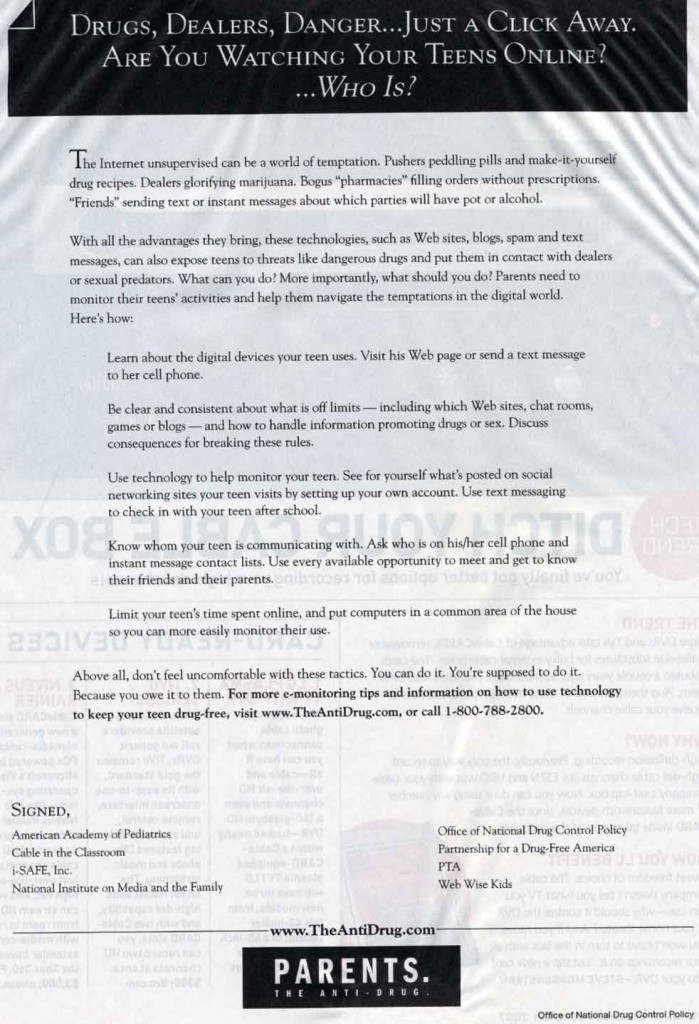My son likes … well, what are some of his interests? Playing table tennis with kids in Japan, & Gears of War on his Xbox (I can’t believe I allowed a Microsoft product into the house), capturing sequences of Halo and making his own movies from them, hunting down the Frag Dolls online. Are you getting an impression here? So it probably comes as no surprise that he prefers certain magazines over others. Forget current affairs. Forget style. Forget sports (not even hockey). But he has stacks of Nintendo Gaming Power, Scientific American, and … that icon of American innovation — Popular Science.

I recently cracked open an issue of Popular Science and was amazed at the advertising I saw. Some of the ads are silly, like this one at right for Rosetta Stone software to learn languages. Something tells me this hardworking farm boy ain’t ever gonna get the Italian supermodel. Don’t he know that communication is a whole lot more than getting the words right? And even if he did buy himself an Armani suit to wear, someone would still have to explain to him that Italy ain’t a town in Iowa.
Sorry about the wrinkly look of the images. I spilled some genuine liquid trust potion all over the magazine and the pages dried all funny. Trust potion raises an interesting question about warranty: if you trust the manufacturer enough to go ahead and order the product, does that verify its effectiveness? Does that exempt them from having to give you a refund if you complain?
But some of the ads are nothing short of propaganda. Some of it’s overt. There are the ads for the military. But some of it is more about promoting an attitude. I get this chilly feeling in my bones and wonder if a lot of the ads and articles aren’t funded by the CIA. A far–fetched conspiracy theory, you wonder? The early symptoms of a clinical paranoia? Before you judge me, take a look at the ad below from the people at www.theantidrug.com. Some of the text is transcribed below:

“Drugs, Dealers, Danger … Just a Click Away. Are You Watching Your Teens Online? … Who Is?
The Internet unsupervised can be a world of temptation. Pushers peddling pills and make–it–yourself drug recipes. Dealers glorifying marijuana. Bogus “pharmacies” filling orders without prescriptions. “Friends” sending text or instant messages about which parties will have pot or alcohol.”
You still think I’m the one who’s paranoid? To avoid all the nastiness of the online world (like blogs), here are some of the things the people at The Anti Drug suggest:
Learn about the digital devices your teen uses. Visit his Web page or send a text message to her cell phone.
Be clear and consistent about what is off limits—including which Web sites, chat rooms, games or blogs—and how to handle information promoting drugs or sex. Discuss consequences for breaking these rules.
Use technology to help monitor your teen. See for yourself what’s posted on social networking sites your teen visits by setting up your own account. Use text messaging to check in with your teen after school.
Know whom your teen is communicating with. Ask who is on his/her cell phone and instant message contact lists. Use every available opportunity to meet and get to know their friends and their parents.
Limit your teen’s time spent online, and put computers in a common area of the house so you can more easily monitor their use.
Most of it sounds like good advice. The basic message seems to be: communicate with your teens and show them you care. But I worry about the phrase: “Use technology to help monitor your teen.” What are the limits? Do we want to risk raising our children to accept without question an environment where they are always watched? To what end? To encourage them to live in fear of the bogeyman? To persuade them that it’s best to give up fundamental freedoms in order to safeguard against the possibility that they might encounter a few who abuse theirs? Is that not what we, as adults, have done? Yesterday the U.S. implemented the first stage in a new round of tightened security measures by requiring passports for everyone traveling through U.S. air space. The U.S. is entitled to protect its sovereignty. But at what cost to its citizens? I thought America was the land where you were entitled to enjoy life, liberty and the pursuit of happiness? Now, we are encouraged to keep our children from even thinking about what it means to be free. If, years ago, adults had set an appropriate example for their children (teaching them a little about the nature of trust and reliance), maybe today’s adults would have found security measures unnecessary.
The ad encourages us not to “feel uncomfortable with these tactics. You can do it. You’re supposed to do it. Because you owe it to them.” Tactics? What is it, exactly, that we are doing here? Raising children? Or waging war? Maybe something in between, like playing chess? Or a game of one–upmanship?
Now here’s a question for you: how many of you parents (be honest with me), how many of you didn’t smoke a joint or try doing something a little rebellious when you were teens? I mean, come on. None of us would ever develop a sense of identity if we didn’t stray a little from the expectations of our parents. Rebellion is a natural part of the process that leads to maturity. If we spend too much time spying on our children, then not only do we waste a lot of our own precious time, we also risk raising children with a maladaptive sense of themselves. You say you what? I thought so. And look … you didn’t turn out so bad after all, now did you?
Disney gave us the circle of life in its cartoon version of Africa. Here’s the circle of life in my version of North America:
Parents tell teens: “Don’t smoke weed.”
Teens smoke weed because their parents told them not to.
Teens grow up into fine young adults.
Fine young adults have kids and become parents.
Their kids grow into teens.
Parents tell teens: “Don’t smoke weed.”
And so it goes …
Maybe Elton John should write a song about it.
My advice to The Anti Drug people is to loosen up a little. Try some of that trust potion. But whatever you do, don’t smoke weed.